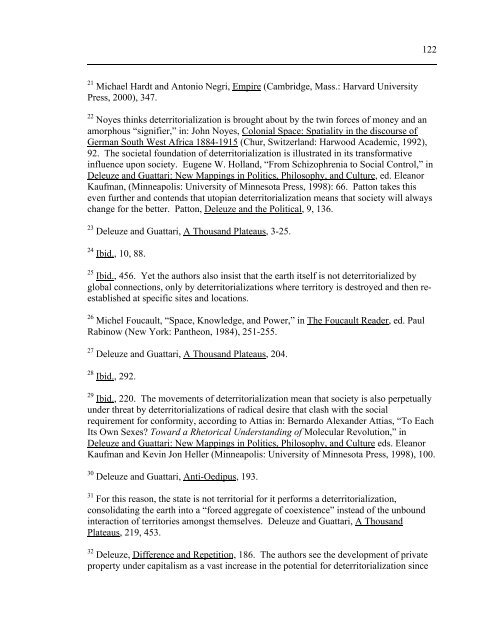A Deterritorialized History: Investigating German Colonialism ...
A Deterritorialized History: Investigating German Colonialism ...
A Deterritorialized History: Investigating German Colonialism ...
You also want an ePaper? Increase the reach of your titles
YUMPU automatically turns print PDFs into web optimized ePapers that Google loves.
21 Michael Hardt and Antonio Negri, Empire (Cambridge, Mass.: Harvard University<br />
Press, 2000), 347.<br />
22 Noyes thinks deterritorialization is brought about by the twin forces of money and an<br />
amorphous “signifier,” in: John Noyes, Colonial Space: Spatiality in the discourse of<br />
<strong>German</strong> South West Africa 1884-1915 (Chur, Switzerland: Harwood Academic, 1992),<br />
92. The societal foundation of deterritorialization is illustrated in its transformative<br />
influence upon society. Eugene W. Holland, “From Schizophrenia to Social Control,” in<br />
Deleuze and Guattari: New Mappings in Politics, Philosophy, and Culture, ed. Eleanor<br />
Kaufman, (Minneapolis: University of Minnesota Press, 1998): 66. Patton takes this<br />
even further and contends that utopian deterritorialization means that society will always<br />
change for the better. Patton, Deleuze and the Political, 9, 136.<br />
23 Deleuze and Guattari, A Thousand Plateaus, 3-25.<br />
24 Ibid., 10, 88.<br />
25 Ibid., 456. Yet the authors also insist that the earth itself is not deterritorialized by<br />
global connections, only by deterritorializations where territory is destroyed and then reestablished<br />
at specific sites and locations.<br />
26 Michel Foucault, “Space, Knowledge, and Power,” in The Foucault Reader, ed. Paul<br />
Rabinow (New York: Pantheon, 1984), 251-255.<br />
27 Deleuze and Guattari, A Thousand Plateaus, 204.<br />
28 Ibid., 292.<br />
29 Ibid., 220. The movements of deterritorialization mean that society is also perpetually<br />
under threat by deterritorializations of radical desire that clash with the social<br />
requirement for conformity, according to Attias in: Bernardo Alexander Attias, “To Each<br />
Its Own Sexes? Toward a Rhetorical Understanding of Molecular Revolution,” in<br />
Deleuze and Guattari: New Mappings in Politics, Philosophy, and Culture eds. Eleanor<br />
Kaufman and Kevin Jon Heller (Minneapolis: University of Minnesota Press, 1998), 100.<br />
30 Deleuze and Guattari, Anti-Oedipus, 193.<br />
31 For this reason, the state is not territorial for it performs a deterritorialization,<br />
consolidating the earth into a “forced aggregate of coexistence” instead of the unbound<br />
interaction of territories amongst themselves. Deleuze and Guattari, A Thousand<br />
Plateaus, 219, 453.<br />
32 Deleuze, Difference and Repetition, 186. The authors see the development of private<br />
property under capitalism as a vast increase in the potential for deterritorialization since<br />
122
















